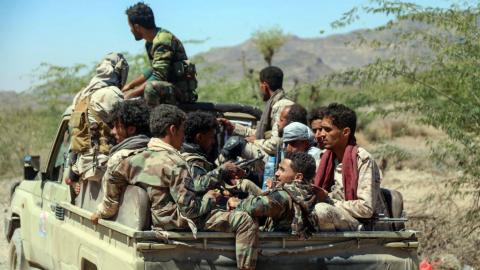Yemen’s Crisis Continues To Worsen With Back To Back Attacks


Merely hours after explosions took 26 lives in Aden last Wednesday, a Saudi-UAE coalition launched air raids in Sanaa, Yemen in alleged retaliation. Blamed on Houthi rebels, their attacks on the country’s main airport in the southern city of Aden were carried out shortly after a plane carrying the newly formed and internationally recognized Cabinet landed, according to an interview with security officials by CBS News. Hours later, Saudi-led coalition warplanes struck the Houthi-held capital of Sanaa, despite Houthis denying responsibility for the attack. While there were no reported casualties in the attack in Sanaa, the airstrikes on Thursday hit at least 15 locations, as reported by Media Line. The country’s new power-sharing government had promised their people to bring peace after the attack on the airport. However, conflict continues to deprive the country of stability.
These ongoing attacks continue to devastate Yemen. Anwar Gargash, the United Arab Emirates’ minister of state for foreign affairs, explained the motives for the attack in a CBS interview stating, “The attack on the Aden airport was meant to destroy the power-sharing deal between Yemen’s internationally recognized government and the southern separatists.” In a statement given to CBS News, Farhan Haq, Deputy Spokesperson for U.N. Secretary-General Antonio Guterres, expresses that the “Secretary-General condemns the deplorable attack on Aden airport shortly after the arrival of the newly formed Yemeni cabinet, which killed and wounded dozens of people.” Additionally, CBS News interviewed Mohammed al-Jaber, Saudi ambassador to Yemen, who described the attack as a “cowardly terrorist act targeting the Yemeni people, their security and stability.”
Throughout the course of the war in Yemen, coalition airstrikes have killed tens of thousands of people, including many civilians. Even though each side of the conflict will always have its reasons, these heinous acts of terror have no justification for killing innocent people. This conflict in Yemen contains a variety of internal and external factors, amplifying each other’s efforts and leading to the worsening of the nation’s state of affairs. Poverty and hunger are skyrocketing and will continue going forward, elevating the world’s most dire humanitarian crisis. The parties in this conflict need to reconcile their differences, with international involvement, in order to find a solution. If this continues, more civilians will lose their lives, and even more, will starve.
The situation in Yemen has been described as the world’s worst humanitarian crisis, according to the United Nations. Yemen, the Arab world’s poorest country, has been devastated by a civil war with at least 56,000 civilians and combatants killed in armed violence since 2016. The administration of the Yemeni government has always been notoriously difficult, two Yemeni states united to form the modern Republic of Yemen only in 1990, without a coherent administrative system. Since 2011, triggered by the Arab Spring, Yemen has been in a state of political crisis with street protests against poverty, unemployment, and corruption. In late 2011, longtime authoritarian president, Ali Abdullah Saleh, handed over his power to deputy Abdrabbuh Mansour Hadi. Hadi struggled dealing with attacks by jihadists, a separatist movement in the south, corruption, unemployment, and food security, as noted by BBC. In May 2015, Saleh allied with the Houthis which led to Houthis taking the capital of Sanaa. Saudi Crown Prince Mohammed bin Salman, as Minister of Defense, decided to intervene in the Yemeni civil war in 2015. MBS told U.S. officials he wanted to “eradicate Iranian influence in Yemen.” Prompted by Hadi, a Saudi-led coalition of nine Middle Eastern and African countries began bombing the Houthis. Although the bombings were initially focused on Houthi military targets, it soon sought out civilian targets such as funerals, hospitals, markets, and even schools. This was intended to be a “quick operation,” however it has stretched years and the ongoing bombings have devastated Yemen.
Hopes for democracy have evaporated soon after the Arab Spring uprising and Yemen’s last seven to eight years have been marred with one of the worst conflicts in the 21st century. Based on the events that have unfolded over the years, there will always be another attack in response to one prior. These aren’t strategic political or military moves, these are people that are losing their lives and starving every day. With almost 20 million Yemenis being food insecure, 90% of their population relies on United Nations humanitarian aid. In addition, it is extremely disheartening how little recognition this conflict receives in Western media. No peace is on the horizon for this humanitarian catastrophe and so far efforts have been unsuccessful to mediate and stop the military confrontation. This is the world’s most forgotten crises and it is crucial that more international involvement and aid is presented to find lasting peace and to provide means of survival and livelihood to the millions of men, women, and children that have been affected.

Yemeni officials on Monday condemned arrests and prosecutions by the Iran-backed Houthi militia directed against media, journalists and celebrities…

Yemen's warring parties are gearing up for new waves of conflict in 2023 amid a lack of decisive steps towards sustainable peace, adding to the suf…

The UAE will help to recruit doctors and deliver crucial supplies for hospitals in Yemen under a major healthcare drive. The Khalifa bin…